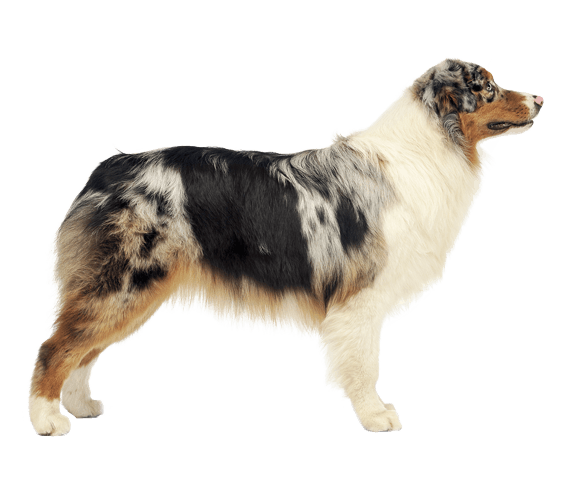Australian Shepherd Breed Maintenance
As mentioned before, the Australian Shepherd’s coat is on the thicker side, which provides a welcome level of weather resistance for this outdoorsy dog. The bad news for pet parents, however, is that with the Australian Shepherd, shedding can be an issue because of its thick coat. If you’re wondering whether Australian Shepherds are hypoallergenic, the answer is no. This breed is a fairly regular shedder.
For the Australian Shepherd, grooming is important. Parents should brush and groom their dog a couple of times a week to remove any loose hair. In addition to this, nails should be trimmed every two to three weeks and ears need to be cleaned weekly in order to avoid infection. It’s also important to brush your dog’s teeth regularly to ensure good dental health.
As Australian Shepherds are prone to eye and joint problems, parents should seriously think about taking out a wellness plan to cover routine vet treatment and check.
Australian Shepherd Health Risks
There are a few medical problems that Australian Shepherds are more vulnerable to. These tend to be focused around the eyes and joints.
Eye problems and defects
Unfortunately for a breed that relies heavily on its sight to work, eye problems are fairly common in Australian Shepherds. These include:
- Cataracts, during which the eye lens gets cloudy and the vision becomes obscured
- Progressive Retinal Atrophy, which can lead to visual impairment over time
- CEA, or Collie Eye Defect, which can result in eye abnormalities or even blindness
Hip Dysplasia
A common issue with larger breeds, hip dysplasia occurs when the hip joint becomes damaged and friction arises between the ball and socket. Over time, this can curtail your dog’s movements, cause them pain and make osteoarthritis more likely.
Responsible parents can help prevent this condition from developing through age-appropriate diets, joint supplements and only buying dogs through breeders who perform screenings for the disease.
Von Willebrand’s Disease
One of more than 30 breeds susceptible to the condition, Australian Shepherds can suffer from Von Willebrand’s Disease. This inherited disorder stems from a protein deficiency that makes it difficult to form enough platelets for effective blood clotting.
Consequently, those affected can suffer from spontaneous or prolonged bleeding, which adds a layer of complication to birth and operations. Vets will also need to be careful about diagnosing certain medicines as some can exacerbate the symptoms.
Keep your Australian Shepherd covered against diseases and disorders with a thorough pet insurance plan from a top insurer — take a look at the options available here.
Feeding an Australian Shepherd - what’s the best diet?
Given that this is a large breed coveted for its immense amount of stamina, you probably won’t be surprised to learn that Australian Shepherds have a voracious appetite. That’s not to say they’re naturally greedy, only that they need a lot of fuel to replace energy expelled.
As they’re dogs prone to hip dysplasia, it’s vital that an Australian Shepherd puppy is fed a diet specifically designed for their age range. This will contain a level of calcium and vitamin D that’s suitable for their developing skeletal system — give your dog too much of these ingredients at this formative age and you run the risk of encouraging hip dysplasia in later life.
Once they’re fully grown, responsible parents should look for high-quality dog food that’s heavy on protein and fatty acids, while being lighter on starchy fillers and mystery ingredients. It’s important to keep Australian Shepherds in lean shape, as obesity can be a factor in the development of hip dysplasia.
Another thing to be conscious of is the amount of treats you give to an Australian Shepherd. Their intelligence and obedience makes them easy to teach tricks and skills, but too many tasty incentives during this learning period can result in an excess number of calories being consumed. Again, it’s crucial to keep Australian Shepherds at a healthy weight to ward off hip dysplasia and other nasty medical conditions.
Wondering what’s the best food to serve up to your Australian Shepherd? Check out Dog Food Advisor’s recommendations for the breed here.






